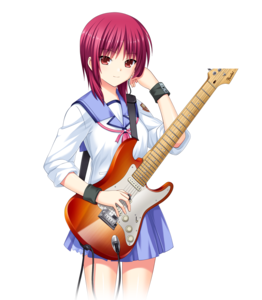Key elicits our strong emotional responses, mainly from the emotional trauma of its characters. They are very good at this, and every time the "feels" come out. This is especially true of its series Angel Beats, which has left me in aforementioned fetal position several times.
While I could go on for days about how incredible this particular anime is, today I want to talk about the disabled characters portrayed in the show. Japan has had a long history and struggle accommodating and accepting its disabled citizens, as many countries have. Unfortunately, I do not have the time or space to further expand on this claim in this article. Disabled characters only began showing up in Japanese media in the late 20th century. Angel Beats (the anime) was released and concluded in 2010. Thus, it provides a good case study in the progress of disabled characters in Japanese media.
To start, I want to address some problems and advantages in using Angel Beats as a case study. 1) The characters presently exist in an able-bodied state, their disabilities being in their back story (previous life.) This is an advantage in my case, due to the characters being able to look back on their life, and analyse how it affected their goals and quality of life. 2) All of the disabled characters I will discuss are female. This is not because the show has many more female characters than male. However, this may be a significant fact. 3) Angel Beats takes place in an afterlife, a sort of purgatory for people who had unfulfilled lives. If the characters finally can experience fulfillment in this afterlife, they are able to move on to their next life.
So let's begin! There are three very specific disabled characters. (I discuss mostly physical attributes. We will leave the mental barriers for another time. These characters are Masami Iwasawa, Yui, and Kanade Tachibana.
Masami Iwasawa

Masami is a complex character, and unfortunately we do not get to see much of her in the series. She is by far my favorite character, for reasons I cannot explain without giving away spoilers. She grew up in a dysfunctional household, and had a very low expectation for her life. However, she found an amazing refuge in music, especially performing. She turns her life around and strives to reach her dream of performing, and expressing herself. Tragically, as a child she was struck in the head by a beer bottle, while trying to break up a fight between her parents. At the height of her life, this injury came back to destroy her in the form of a stroke. She was left unable to move or talk, until she finally died.
This story is incredibly tragic! It also says a lot about how Key sees disability, at least in this particular instance. Masami's disability absolutely destroyed her, without any hope of recovery. It took away the only thing that give her life purpose, music. Fortunately, Masami is given another opportunity in the afterlife. She expresses that she cannot regret what happened to her before, but she still lives for music. It is through music, that she finally achieves fulfillment.
Yui
Yui is an adorable character, and one that has an unquenchable spirit. In her previous life, she was disabled. Her disability? Paralyzed from the waste down. Forunately, Yui had an amazingly supportive mother who took care of her every day. Sadly, Yui always felt incredible guilt for being such a burden on her mother. This guilt carries over with her to the afterlife, where she regrets what a burden she was. She also regrets not being able to marry, because no one would marry someone who was such a burden. This is an incredibly sad narrative of the reality for some disabled in Japan. While it is true that such a serious disability is really quite a burden, it is tragic that Yui considered herself useless. Fortunately, in the series another character in the afterlife promises that he would have actually marry her! In the show we get to see a heartwarming and emotional reenactment of her previous life, with this man who falls in love with her, despite her condition. This too is a useful narrative on the value of accepting someone with such a disability. It is ultimately this acceptable, that grants Yui fulfillment.
Kanade Tachibana
Kanade is quite a mysterious character, and critical to the story. I wish to try and discuss her relevance to the topic, without revealing too many spoilers. Kanade, in her previous life, was disabled via a bad heart. This condition made it impossible for her to stress her body in any way. It ultimately threatened to kill her. Fortunately she was able to get a new heart, and live out her days as a mostly normal girl. This narrates how accommodation can change a disabled or potentially disabled person's life. Without accommodation, Kanade's quality of life would have been greatly diminished, and she would have most likely died young.
Why these three characters? Well they present three very important arguments on disability.
Masami: Disability can absolutely destroy a person's life.
Yui: Acceptance is critical to a disabled person and their happiness.
Kanade: Accommodation makes all the difference for a disabled person.
In conclusion? I say disabled character portrayal in Japanese media has improved drastically, at least in this case study. Now, I urge you to watch the show yourself!






I never would have guessed the show addressed these kinds of issues just by looking at the cover! Good find!
ReplyDelete